Irish Farmers' Association (IFA) presidential candidates Martin Stapleton and Francie Gorman diverged on the prospect of the association backing proposals to open voluntary cow reduction schemes for dairy and suckler farmers at the Irish Farmers Journal’s live debate on Monday night.
Drystock farmer Francie Gorman of Co Laois - the current IFA south Leinster chair - said he would support a cow reduction scheme on the basis that the scheme would not sterilise land.
His opponent, dairy farmer Martin Stapleton from Co Limerick, rejected the idea of supporting a voluntary reduction scheme. Stapleton is the IFA’s current treasurer.
The question of support for a reduction scheme was put to each candidate during the live Irish Farmers Journal debate on Monday, just as the first round of IFA branch AGMs saw farmers cast their votes to begin the process to select the next leader of the association.
No reduction for Stapleton
Stapleton answered first by stating that he was opposed to “any sort of a reduction” to cow numbers.
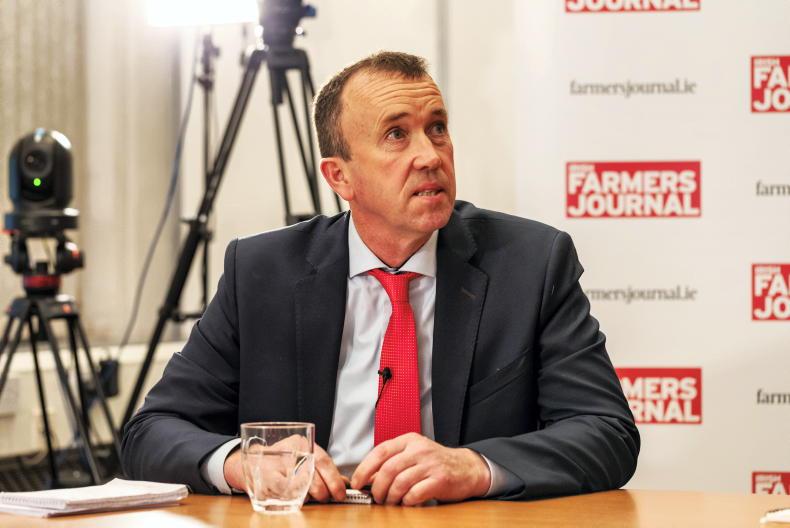
Martin Stapleton is opposed to the idea of a voluntary cow reduction scheme for dairy and suckler farmers. \ Philip Doyle
He said that he was fundamentally opposed to the idea of giving up ground on the farm production front, but would push for an early retirement scheme to offer a viable exit route for farmers nearing retirement age.
“I think, as a bottom line, we should defend our right, our duty, to produce food in this country. Production reduction is not a positive policy that we should get ourselves involved in,” Stapleton commented.
“I understand there are many farmers out there who see this as an opportunity for retirement or for change to a different way of life or something different.
“But, in my view, the best way to encourage people to get out is to go back to a very successful scheme we had in the early 1990s, the successful early retirement scheme, which encourages people to come into it.”
Gorman sees potential
Gorman maintained that the IFA should have at least heard what the Department of Agriculture would offer to farmers participating in any dairy or suckler reduction scheme.
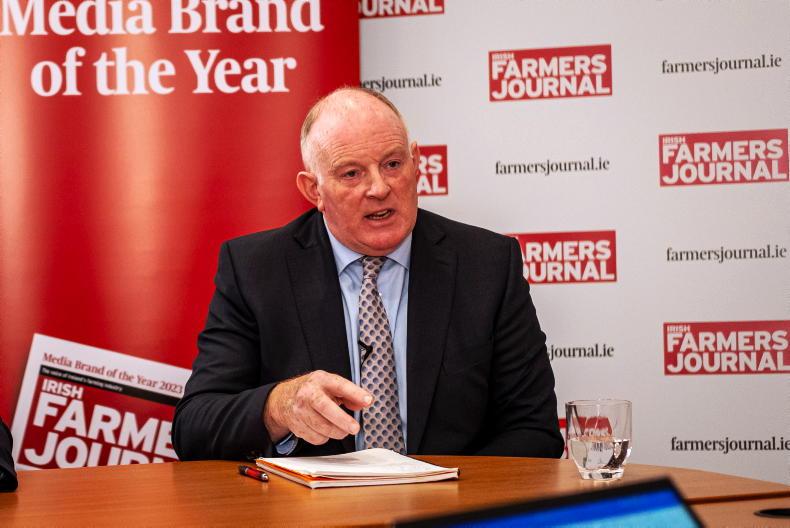
Francine Gorman believes Irish farmers are being squeezed out of production as it stands. \ Philip Doyle
“The reality is at the moment that we have reduction being imposed on farmers by stealth, so I think we may have lost an opportunity here,” responded Gorman.
“There are a lot of farmers both on the suckler side of the house and the dairy side of the house who would have been interested in a retirement scheme of sorts or whatever way you look at it, provided that we have some ground rules.”
The Laois man suggested that these ground rules would include safeguards that would prevent land sterilisation and ensuring that alternative supports remain available to the farmers who choose not to participate in the reduction scheme.
“I would have been certainly more inclined to sit in with the Department and see what could have come of it,” he continued.
Gorman added that if the IFA did not like a version of reduction put on the table by the Department, it could always look for a better deal for farmers.
De-risking derogation
Both candidates were questioned on the position they would take on the nitrates derogation stocking rate reduction from 250kg organic N/ha to 220kg N/ha for the majority of the country post-2024.
Stapleton said he will look to minimise the risk the 220g N/ha derogation stocking rate faces by putting “solid proposals” on the table which are backed by science. An example he gave was increasing slurry storage capacity on farms.
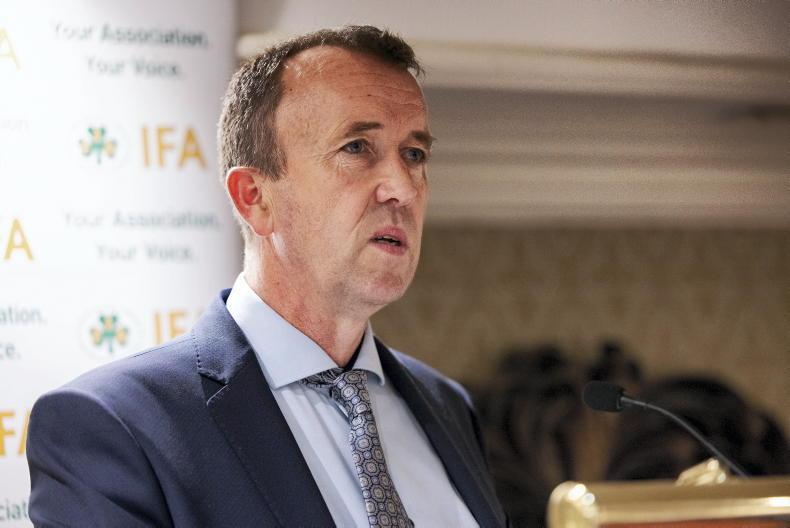
The focus must turn to maintaining 220kg N/ha, according to Stapleton. \ Donal O'Leary
“I think the derogation is the single biggest problem that we're going to have to sort over the next two years,” he responded.
“It’s very straightforward here, 220kg is now the upper limit of the derogation and if we lose that difference of 50kg and go back to 170kg, it is a catastrophe for dairy farmers and the efficient dairy farming we know in Ireland.
“The science here is very, very promising that we can defend ourselves on science.
“There is no evidence here to suggest a cap on stocking rate is going to improve water quality - it seems to be a measure put in places across Europe in a completely different style of farming,” he claimed.
Push back until 2025
Gorman agreed that the derogation cut to 220kg N/ha is one of the most significant challenges facing farmers at present and insisted his focus, if elected president, would be to push for the reduction to be pushed out for 24 months to allow farmers to plan herd management around the cut.
“Even in the short term, there is going to be an awful lot of cows on the ground in spring calving down and there is essentially no home for them,” he told viewers.
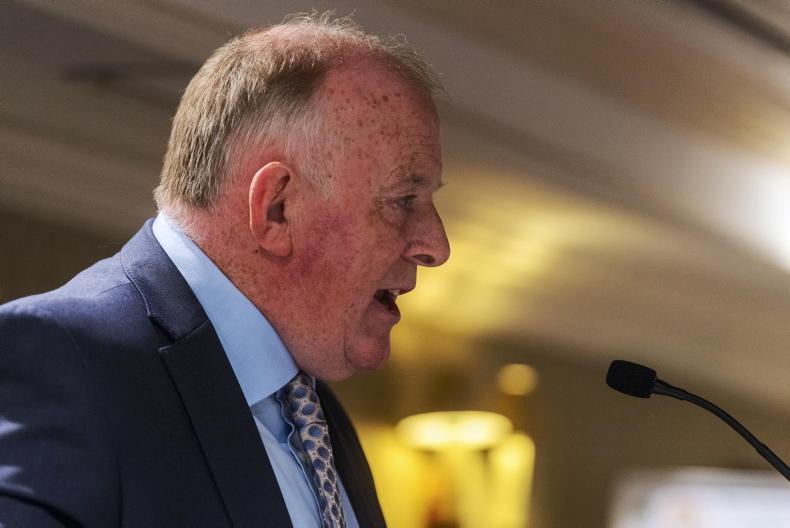
Gorman said he would push for flexibility on derogation stocking rates, as cows are already in-calf for 2024. \ Andy Gibson
“The fact that this decision was taken so late in the day, it gives farmers nowhere to go.
“We need an agreement from Brussels that this will be pushed out until at least 2025 to give those cows [time to] be able to calve down in the spring, find a home and give farmers a clear sight of where they can plan for the next 12 months.”
The Laois farmer stated the he would pursue a more “proactive” model of engaging with the Department when policies are being drafted instead of “lobbying against” decisions when they have already been made by politicians.
He added that the IFA should “draw a line in the sand” as to when it will protest after lines are crossed contrary to the association’s policy goals.
You can watch the full live debate back here.
Read more
Watch back: IFA presidential debate
IFA a 'mudguard' for the minister
IFA members to cast votes at 80 branch AGMs on Monday night
Opinion: the IFA presidential election deserves your involvement
Irish Farmers' Association (IFA) presidential candidates Martin Stapleton and Francie Gorman diverged on the prospect of the association backing proposals to open voluntary cow reduction schemes for dairy and suckler farmers at the Irish Farmers Journal’s live debate on Monday night.
Drystock farmer Francie Gorman of Co Laois - the current IFA south Leinster chair - said he would support a cow reduction scheme on the basis that the scheme would not sterilise land.
His opponent, dairy farmer Martin Stapleton from Co Limerick, rejected the idea of supporting a voluntary reduction scheme. Stapleton is the IFA’s current treasurer.
The question of support for a reduction scheme was put to each candidate during the live Irish Farmers Journal debate on Monday, just as the first round of IFA branch AGMs saw farmers cast their votes to begin the process to select the next leader of the association.
No reduction for Stapleton
Stapleton answered first by stating that he was opposed to “any sort of a reduction” to cow numbers.

Martin Stapleton is opposed to the idea of a voluntary cow reduction scheme for dairy and suckler farmers. \ Philip Doyle
He said that he was fundamentally opposed to the idea of giving up ground on the farm production front, but would push for an early retirement scheme to offer a viable exit route for farmers nearing retirement age.
“I think, as a bottom line, we should defend our right, our duty, to produce food in this country. Production reduction is not a positive policy that we should get ourselves involved in,” Stapleton commented.
“I understand there are many farmers out there who see this as an opportunity for retirement or for change to a different way of life or something different.
“But, in my view, the best way to encourage people to get out is to go back to a very successful scheme we had in the early 1990s, the successful early retirement scheme, which encourages people to come into it.”
Gorman sees potential
Gorman maintained that the IFA should have at least heard what the Department of Agriculture would offer to farmers participating in any dairy or suckler reduction scheme.

Francine Gorman believes Irish farmers are being squeezed out of production as it stands. \ Philip Doyle
“The reality is at the moment that we have reduction being imposed on farmers by stealth, so I think we may have lost an opportunity here,” responded Gorman.
“There are a lot of farmers both on the suckler side of the house and the dairy side of the house who would have been interested in a retirement scheme of sorts or whatever way you look at it, provided that we have some ground rules.”
The Laois man suggested that these ground rules would include safeguards that would prevent land sterilisation and ensuring that alternative supports remain available to the farmers who choose not to participate in the reduction scheme.
“I would have been certainly more inclined to sit in with the Department and see what could have come of it,” he continued.
Gorman added that if the IFA did not like a version of reduction put on the table by the Department, it could always look for a better deal for farmers.
De-risking derogation
Both candidates were questioned on the position they would take on the nitrates derogation stocking rate reduction from 250kg organic N/ha to 220kg N/ha for the majority of the country post-2024.
Stapleton said he will look to minimise the risk the 220g N/ha derogation stocking rate faces by putting “solid proposals” on the table which are backed by science. An example he gave was increasing slurry storage capacity on farms.

The focus must turn to maintaining 220kg N/ha, according to Stapleton. \ Donal O'Leary
“I think the derogation is the single biggest problem that we're going to have to sort over the next two years,” he responded.
“It’s very straightforward here, 220kg is now the upper limit of the derogation and if we lose that difference of 50kg and go back to 170kg, it is a catastrophe for dairy farmers and the efficient dairy farming we know in Ireland.
“The science here is very, very promising that we can defend ourselves on science.
“There is no evidence here to suggest a cap on stocking rate is going to improve water quality - it seems to be a measure put in places across Europe in a completely different style of farming,” he claimed.
Push back until 2025
Gorman agreed that the derogation cut to 220kg N/ha is one of the most significant challenges facing farmers at present and insisted his focus, if elected president, would be to push for the reduction to be pushed out for 24 months to allow farmers to plan herd management around the cut.
“Even in the short term, there is going to be an awful lot of cows on the ground in spring calving down and there is essentially no home for them,” he told viewers.

Gorman said he would push for flexibility on derogation stocking rates, as cows are already in-calf for 2024. \ Andy Gibson
“The fact that this decision was taken so late in the day, it gives farmers nowhere to go.
“We need an agreement from Brussels that this will be pushed out until at least 2025 to give those cows [time to] be able to calve down in the spring, find a home and give farmers a clear sight of where they can plan for the next 12 months.”
The Laois farmer stated the he would pursue a more “proactive” model of engaging with the Department when policies are being drafted instead of “lobbying against” decisions when they have already been made by politicians.
He added that the IFA should “draw a line in the sand” as to when it will protest after lines are crossed contrary to the association’s policy goals.
You can watch the full live debate back here.
Read more
Watch back: IFA presidential debate
IFA a 'mudguard' for the minister
IFA members to cast votes at 80 branch AGMs on Monday night
Opinion: the IFA presidential election deserves your involvement









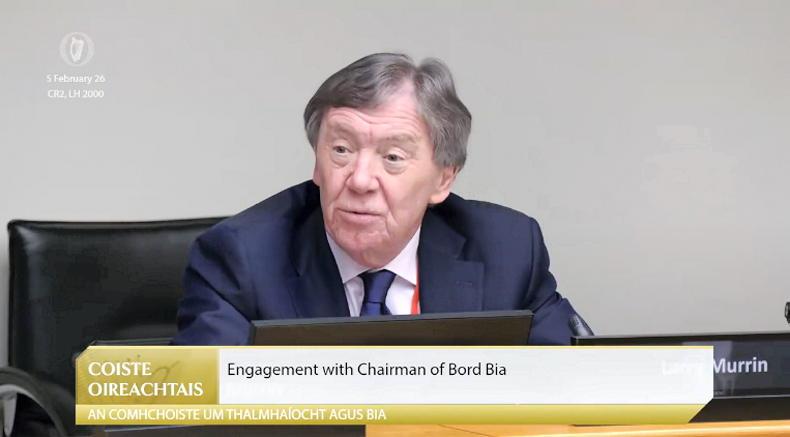

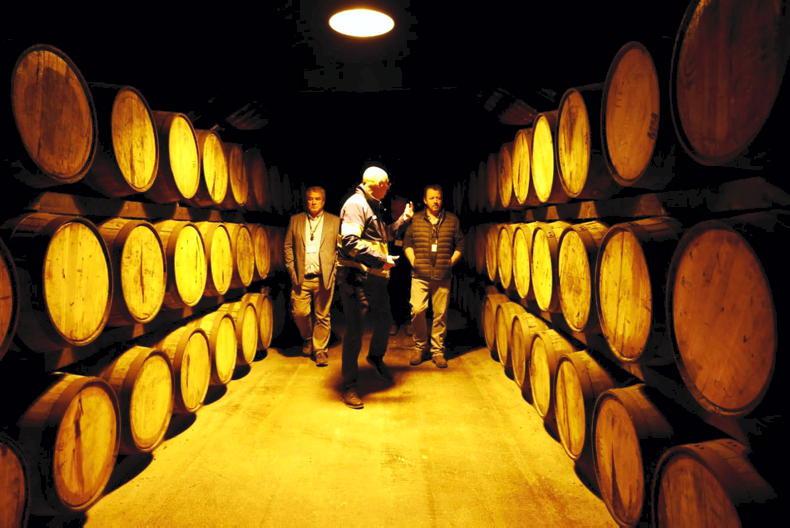


SHARING OPTIONS